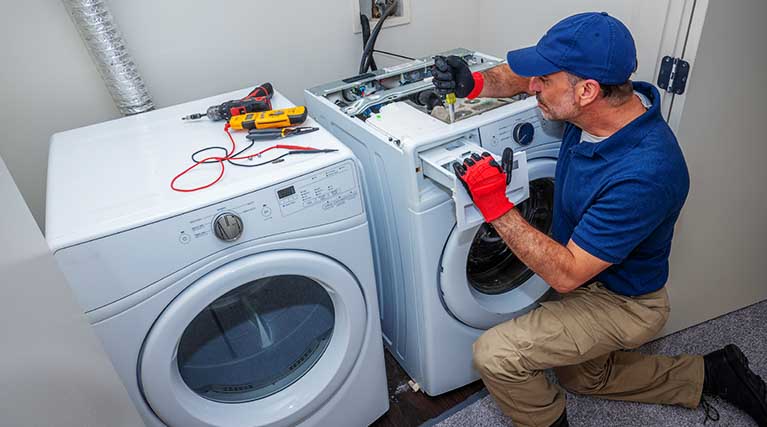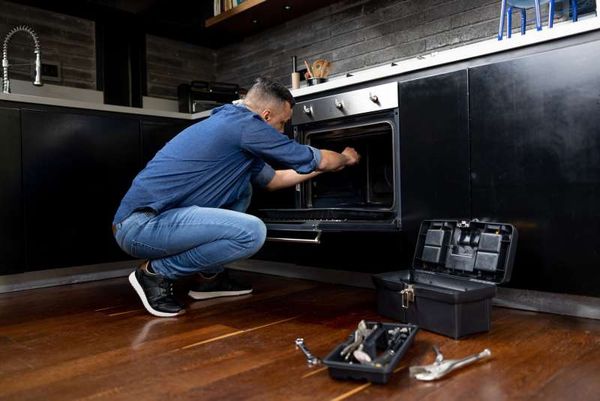The Ultimate Guide to Understanding Appliance Fixing at Home
When your refrigerator quits cooling down or your stove rejects to heat, it can feel overwhelming. Recognizing home appliance repair work in your home can conserve you money and time. You'll find out to acknowledge signs and symptoms, use necessary tools, and adhere to a methodical troubleshooting procedure. Prior to you begin, there are essential security precautions you require to take into account. What are the most typical problems, and exactly how can you fix them? Let's discover the essentials.
Common Home Appliance Problems and Their Signs and symptoms
When your devices begin breaking down, it's important to recognize the indicators early. Disregarding them can lead to larger problems and pricey repair work. If your fridge isn't cooling correctly, you might notice warm spots or condensation developing. This could suggest a falling short compressor or a blocked vent.Your dishwashing machine may reveal troubles through unclean dishes or unusual sounds during cycles. If you listen to grinding or clanking, it's time to investigate.A cleaning equipment that won't rotate or drain pipes can leave you with soggy washing, suggesting a clogged up drain or a malfunctioning pump.Lastly, if your oven's temperature appears off or it takes permanently to preheat, you may be taking care of a defective thermostat. By staying sharp to these symptoms, you can address concerns prior to they rise right into significant repair work.
Crucial Devices for Device Repair Service
When you're tackling appliance repairs in your home, having the right devices is necessary. Basic hand tools like screwdrivers and pliers will aid you disassemble and deal with numerous devices, while electric testing tools guarantee you're working securely with electrical wiring. Allow's discuss what you require to start on your repair service trip.
Standard Hand Devices
Having the right devices is essential for efficient home appliance fixing in the house. Start with a dependable screwdriver set, including both flathead and Phillips types, as screws are usual in device setting up. Pliers are likewise important; they assist with gripping, twisting, and reducing wires or tiny elements. A set of needle-nose pliers can get to limited areas easily. You'll need a great flexible wrench for tightening or loosening up nuts and bolts. An utility blade is helpful for puncturing packaging or insulation. Ultimately, don't forget a sturdy workbench or surface to securely organize your devices and parts. With these basic hand tools, you'll be well-prepared to tackle most appliance repairs that come your means.
Electrical Screening Gadgets
Along with basic hand devices, electrical testing tools play a crucial duty in device repair service. These devices help you identify electrical concerns and guarantee devices work safely. A multimeter is important; it measures voltage, existing, and resistance, enabling you to determine problems promptly. A non-contact voltage tester is an additional essential, allowing you find online cords without making straight get in touch with, enhancing your safety and security. Clamp meters are terrific for gauging current circulation in cables without separating them, saving you time and effort. In addition, circuit testers can swiftly inspect if outlets are working properly. By utilizing these tools, you'll streamline your troubleshooting process and improve your repair service abilities, making appliance upkeep a great deal simpler.
Step-by-Step Overview to Diagnosing Device Issues
When your home appliance breaks down, it can be frustrating, yet detecting the concern does not need to be frustrating. You'll learn to determine typical problems and use efficient repairing strategies. Allow's go through the actions to get your device back in working order.
Typical Device Troubles

Troubleshooting Strategies Discussed

Repairing Significant Cooking Area Appliances: A Closer Look
Have you ever wondered how to tackle typical issues with your cooking area home appliances? Fixing significant cooking area home appliances like fridges, ovens, and dish washers can be simpler than you assume. Beginning by determining the issue-- whether it's a refrigerator not cooling down or a stove that will not warm. Frequently, an easy reset or inspecting the source of power can solve the issue.For refrigerators, clean the condenser coils and check the door seals. If your stove's not heating, evaluate the burner and thermostat. Dishwashers could simply need a clean filter or a reset to get them back in activity. Constantly disconnect the appliance before diving right into repairs to ensure your safety.Don' t fail to remember to get in touch with the user manual for specific repairing ideas associated with your model. With a bit of persistence and the right tools, you can with confidence take on home appliance repair services and conserve money while doing so!

Fixing Washing Equipments: Tips and Techniques
When your laundry devices begin breaking down, it can feel frustrating, but repairing them doesn't need to be an inconvenience. Beginning by checking the power supply. Verify the home appliance is connected in and the outlet is operating. Next off, evaluate the door or lid button; a faulty switch can prevent the maker from operating.For washing machines, if it's not spinning, look for unbalanced lots. Redistributing the clothing could solve the problem. If your clothes dryer isn't heating, clean the dust filter and check the vent for blockages.Listen for uncommon sounds; they can show an issue. If your device is dripping, examine the tubes for splits or loose connections. File any kind of error codes displayed on digital displays, as they can direct you in determining the issue. Seek advice from the customer handbook for particular troubleshooting pointers related to your design.
Safety And Security Precautions to Take During Services
Before you begin any kind of appliance repair work, it's necessary to focus on safety to avoid mishaps or injuries. Unplug the appliance or turn off the circuit breaker to guarantee no power reaches it while you work. Usage shielded devices to minimize the threat of electrical shock. Use security goggles and gloves to secure on your own from sharp edges or debris (Dependable Refrigeration & Appliance Repair Service Washer repair near me).Make certain your workspace is tidy and well-lit, so you can see what you're doing. Maintain children and pet dogs away from the area to prevent distractions and prospective threats. If you're handling gas appliances, be additional cautious; look for leakages prior to proceeding.Take your time, and don't hurry through repairs. If you feel unclear about any kind of step, it's much better to pause and study than to think. Adhering to these preventative measures will aid create a more secure environment for your DIY home appliance repair job
When to Call a Specialist for Help
Exactly how do you know if it's time to employ a professional for appliance repairs? If you have actually tried standard look at this website troubleshooting without success, it's a clear sign. As an example, if your home appliance still will not start or shows unusual sounds after resetting it, do not think twice to look for specialist help.When you notice leaks, smoke, or burning scents, focus on safety and security and call a pro promptly. These concerns can result in more considerable damages or present risks to your home.Also, if your home appliance is under guarantee, calling a specialist is often the finest path. They can assure that repairs won't void your guarantee, saving you money in the long run.Finally, if you're uncertain or awkward with complicated repair work, it's important to leave it to the professionals. Keep in mind, dealing with complex problems without the ideal knowledge can cause expensive errors. Count moved here on an expert when in question!
Often Asked Questions
How Can I Stop Device Troubles in the Future?
To avoid home appliance issues in the future, you must perform routine maintenance, look for wear and tear, tidy filters, and prevent overloading. Staying positive will certainly aid extend their life-span and maintain them running smoothly.
What Are the Many Typical Do It Yourself Device Fixing Mistakes?
You could overlook safety and security preventative measures, avoid troubleshooting actions, or make use of inaccurate tools when attempting do it yourself device repair work. Hurrying the procedure or neglecting maker standards can cause more substantial issues and costly errors. Keep client and educated!
Just how Do I Know if a Component Needs Replacement?
You can inform if a part requires replacement by looking for unusual noises, leaks, or inconsistent performance. If the device battles to run properly or reveals visible damages, it's most likely time for a substitute.
Can I Utilize Generic Parts for Home Appliance Repairs?
Yes, you can make use of generic parts for home appliance fixings, yet ascertain they work - Washer dryer repair service Dependable Refrigeration. Common components may save you cash, however they might influence performance or durability, so evaluate your choices carefully before choosing
What Warranties Cover Device Fixes?
Many appliance warranties cover repair services for producing issues, yet they usually omit damage from misuse. Check your service warranty terms meticulously, as some may need utilizing qualified professionals and initial components for protection to remain valid.